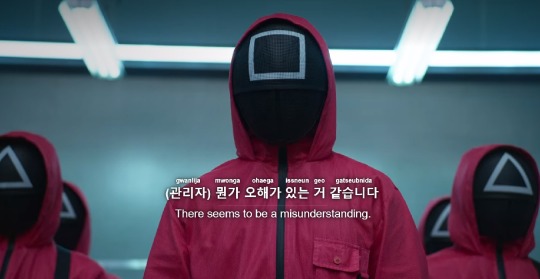#squid game vocab

따라(서)
This form is the combination of the verb 따르다 (to follow) and the simple clause connecting form 아/어(서) which we covered a little while ago. As you may remember, when a word ends in the vowel 으, the following conjugation depends on the preceding vowel. If the preceding vowel is 아, then the 아(서) conjugation is used. For any other preceding vowel, 어(서) is used. Given that 따르다 has the preceding vowel 아, it is conjugated to 따라(서).
This form can be used in a sentence to connect 따르다 to another verb, for example, 따라 가다 (to follow someone who is going somewhere).

에 따라(서)
When 에 is added to this form, the meaning changes. The typical formulation of this form in a sentence is N + 에 따라(서) + A, and it’s used to say that in accordance with N, V happens. Here are some examples of how this may be used:
According to the directions, we should go that way.
길안내에 따라서 우리는 저 쪽으로 가 야 돼요.
People should act in accordance with the culture of a country.
사람들은 그 나라의 문화에 따라 행동을 해 야 돼요.
If we understand 에 따라(서) to mean ‘in accordance with,’ we can then figure out the meaning of the Game Administrator’s statement, 여러분의 뜻에 따라 게임의 중단 여부를 투표하겠습니다. He is saying ‘in accordance with your wishes (뜻에 따라), we will take a vote to decide whether or not the game will end.
We can also understand the Game Administrator’s next statement. He says ‘참가자 한 명당 걸려 있는 상금 액수 1억 따라서 255억의 상금이 돼지 저금통에 적립되었습니다’. The first clause means ‘for every player, the amount of money at stake was 1억,’ and the second means ‘225억 has been collected into the piggy bank’. If 따르다 connects these two clauses, then we can come to the conclusion that the full sentence must translate to ‘Following (the rule) that for every player, the amount of money at stake was 1억, 255억 has been accumulated in the piggy bank’.

동의 agree/consent
투표 vote
뜻 wish/opinion
여부 whether or not
에 앞서(서) ahead of
적립되다 to be raised/saved
공개하다 to make public/release to people
숫자 number
N + 당 per N
걸리다 to hang/be at stake
액수 amount
따라서 therefore
돼지 저금통 piggy bank
포기하다 to give up
유가족 bereaved family
각각 each
씩 each
전달되다 to be delivered
빈손 empty hand
총 total
동의서 agreement
조 article (in a law or contract)
항 section (in a law or contract)
임의로 randomly/of your own accord
중단 interruption/discontinuance
중단하다 to discontinue an action (used in formal settings)
_짓을 하다 to do something _ (used with adjectives)
무사하다 to have nothing bad happen
실종되다 to disappear/go missing
방금 soon (past)
금방 soon (future)
아마 probably/likely
풀다 to release
위치 position/location
추적 trace/track down
끝장 final stage/unfortunate end
끝장아야 it’s the end/you’re done for
거부하다 to refuse
처리되다 to be dealt with/disposed of
과반수 majority

There are many translations within Squid Game which don’t do justice to the original script, and this is one of the most significant for me. After the first game, where the players have realised that losing the game results in their death, player 271 steps forward and pleas ‘우리가 빚을 졌지, 죽을죄를 지은 건 아니잖아요!’ There are two significant phrases here, the first being 빚을 지다 (to be in debt), and the other 죽을 죄를 지었습니다, which has many connotations attached to it.
Firstly, focusing on 죽을 죄를 지었습니다, this is likely a phrase which you have heard before even if you don’t recognise it. 죽을 죄 means unforgiveable sin/crime, and 지었습니다 means to commit. This is a common phrase in historical dramas where someone has to bow down to a member of the royal family or a army general to express their guilt at their actions in the hope of a lenient sentence (even if they’ve done nothing wrong). Someone of a lower class or place within society may also be forced to say it by someone above them as a way to demonstrate power and ‘put them in their place’.
If we look at the phrase as a whole, then, we have ‘yes, we’re in debt, but we haven’t committed some unforgiveable sin/crime. You know that.’ Whilst the translation in the subtitle is similar (we may be in debt, but that doesn’t mean we deserve to die), I feel that this translation points more towards the games being unfair and immoral, rather than the writers’ intention of highlighting the players as good people. Yes, some of the players, such as Jang Deok-su have committed crimes, and are in debt due to their own immoral lifestyles, but many are just unfortunate victims of an unjust society. Seong Gi-hun is an example of this. His character provides a reference to the real-life 2009 Ssangyong Motor strike, where nearly 2,600 workers who occupied the plant for seventy-seven days to protest layoffs were violently beaten down by police. Many of these protestors went to jail, which may be the reason that Gi-hun struggles to find and hold down a good job. As a result, he is desperate for money, especially since he wants to give his daughter expensive gifts. He gambles, and this causes his debt. Ultimately, Gi-hun did nothing wrong. He is a victim of his circumstances, and this is what the writers wanted to highlight - that almost all of the players are unfortunate victims of society, who are victimised yet again through the games. Therefore, ‘we haven’t committed some unforgiveable crime/sin’ is much more fitting to me, even if it isn’t a very natural phrase in English. Maybe the subtitle translator should have gone with something like ‘yes, we’re in debt, but we were pushed into it through no fault of our own. Does that really mean that we deserve to die?’. This highlights the innocence of the players much more.
Themes of unjust society, and the widening of the income gap are incredibly important to Squid Game’s narrative. Some great articles to read to learn more about these themes can be found here:
❥Squid Game lays bare South Korea’s real-life personal debt crisis
https://www.theguardian.com/world/2021/oct/08/squid-game-lays-bare-south-koreas-real-life-personal-debt-crisis
❥Squid Game’s Strike Flashbacks Were Modeled on Our Real-Life Factory Occupation
https://jacobinmag.com/2021/11/squid-game-ssangyong-dragon-motor-strike-south-korea

뭔
This particle is a shortened version of 무슨, meaning what / which one / what kind of. This is a contraction which sounds very informal, even when used with a formal sentence structure such as 습니다. It will sound rude if said to anyone older or anyone who you don’t know very well. Because of this, it’s fairly uncommon to hear this grammar being used unless you happen to be around a group of very close friends. Here are some examples of how it can be used:
What do you mean?
무슨말이야?
뭔말이야?
What jealousy?! / I’m not jealous!
무슨질투?!
뭔질투?!

뭔가
This grammar principle is actually a combination of 3 different forms: 무엇 (what / something), 이다 (it is / there is), and (으)ㄴ 가(요).
For a quick overview of (으)ㄴ 가(요), this is a sentence ending where the speaker is indirectly asking about something which they are curious about. It’s a softer, less direct way of asking a question and is best translated in English as ‘I wonder’. For example:
I wonder, how much is this?
이건얼마 인가요?
I wonder, will you come tomorrow?
내일도오실 건가요?
Combining these principles then, we have 무엇 + 이다(there is something or it is something), and then 무엇 인가(요) (I wonder if there is something, or I wonder if it is something). 무엇 인가(요) is almost always shortened to 뭔가(요).
I wonder…it’s something that you cant figure out, right?
뭔가모르겠지?
If it’s not that, I wonder what it is?
그게 아니라면 뭔가?

뭔가 Additional Meanings
Alongside the explanation above, there are two other ways in which 뭔가 can be used. Firstly, it can be used as a filler word when you are trying to pad out your speech or are struggling for your next word. Secondly, 뭐 and (으)ㄴ 가요 can sometimes simply mean ‘something’ without any nuance of indirect questioning, like in these examples:
I feel like something sweet.
뭔가 단 것이 땡긴다.
Yuseok, you have something on your face.
유석 씨의 얼굴에 뭔가묻었어요.
This second usage is what is being used in the example from the Game Administrator in this scene. He is saying that it seems (것 같다) that something (뭔가) has been misunderstood (오해가 있는것). Obviously then, the translation here is very accurate to what is actually being said.

선생님
As beginners, Korean learners are told that 선생님 is a formal way to refer to a teacher. So why is Han Mi-Nyeo calling the Game Administrator 선생님 when obviously he isn’t a teacher?
선생님 actually has an additional meaning that is used quite frequently and is very important to understand. It can be used to address someone in a formal way, and is used often when you need the attention of a stranger, or someone whose name is unknown. Here are some examples of how it may be used:
Excuse me, you can’t be in here.
실례합니다,선생님 여기 계시면 안 됩니다만.
Excuse me, what’s happening?
실례합니다,선생님 무슨 일이야?
Excuse me, is there a problem?
선생님 무슨 문제 있어?
Here, Han Mi-Nyeo is calling the Game Administrator 선생님 because she doesn’t know his name, but also because she wants to put herself in a position far below him and show respect in the hope that she can appeal to him and be released from the game. This is also why she is kneeling down and clasping her hands together. Her body language and speech in this scene all highlight that she is trying to show to the Game Administrator that he is a highly respectable person, whilst lowering herself in an attempt to gain his pity. Here, the translation of ‘please, sir’ is actually fairly good. It expresses her desperation and desire to appeal to him by showing respect well.
지옥 hell
관리자 administrator
통과하다 to pass (through)
참가자 participant
결과 result
탈락하다 to fail/ be eliminated/ drop out
끝마치다 to finish (same as 끝나다 and 마치다)
갚다 to pay back
애 baby (abbreviation of 아이)
짓다 to build/make/name
출생 birth
신고(서) declaration
출생 신고 birth registration
내보내다 to send out/let out/release
어떻게든 somehow/by any means (shortened version of 어떻게 해서든)
뭔 something/filler word
오해 misunderstanding
